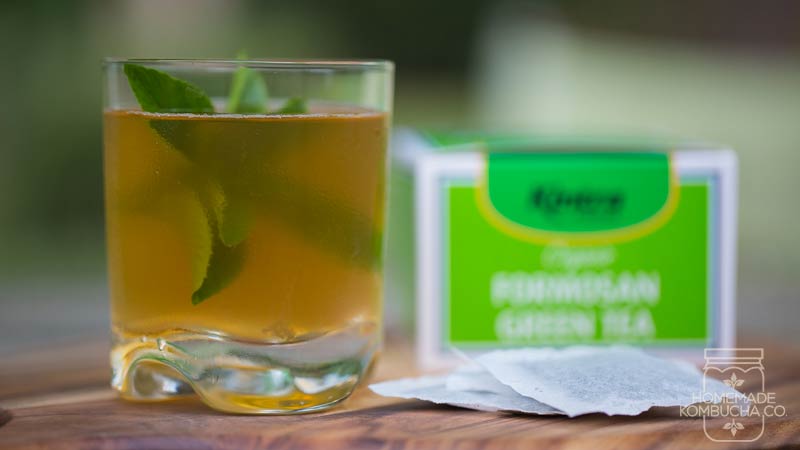Although many may view kombucha as the latest craze amongst modern, health fanatical, hipsters and hippies, it has actually been used as a health drink and medicinal supplement for thousands of years.
In recent times kombucha has become known for its high antioxidant levels and beneficial probiotics. To date there has been little research conducted on the health benefits using proper human trials, however, animal and cell models as well and anecdotal research has shown the fermented tea drink does deserve the hype it is receiving.
At the Homemade Kombucha Co. we are excited to see what future scientific research holds for kombuchas reputation as a health elixir.
Kombucha as a source of antioxidants
Antioxidants are powerful substances that help prevent cellular damage from free radicals and other reactive molecules. Tea has long been known for its high antioxidant activity which is due to the presence of polyphenols, ascorbic acid and DSL (another acid known for its detoxifying and antioxidant activity)1.
These antioxidants provide beneficial effects such as alleviations of inflammation, enhancing immunity and cancer prevention. Fermented tea has been observed to possess an even higher antioxidant activity level than unfermented tea arguably providing additional health benefits 1.
The increased antioxidant levels in kombucha are likely due to the production of low molecular weight components and modifications to the structure of polyphenols by the enzymes produced during fermentation. The increase in activity is dependent on fermentation time, quality of tea and the microbiota of the SCOBY 2.
Simply put – if you drink kombucha for health reasons then looking after your SCOBY with quality ingredients is extremely important.
Kombucha as a probiotic
The effects of probiotics on health and wellness been known since ancient times. Fermented foods like kombucha are an easy source of probiotics. Probiotics are living microorganisms that improve microbial gut balance, usually including a range of bacteria and yeasts 3.
In recent times the body of research showing benefits from probiotic supplementation has increased. Benefits can include: good intestinal health, enhancing the immune system and response, reduction of serum cholesterol and cancer prevention 4. Evidence also demonstrates probiotics can help balance the gut microbiome with people suffering antibiotic-associated diarrhoea and coronary heart disease prevention due to reducing serum cholesterol levels 4.
The mechanisms of how the probiotics cause these effects are not yet fully understood however they may be to short chain fatty acid production (SCFAs), lowering of gut pH and improving the mucosal barrier inside the gastrointestinal tract 5.
The microbial composition can vary slightly kombucha to kombucha and it is always important quality ingredients and sterile conditions are used to ensure only the beneficial microbes are growing. It is common nowadays to for store bought kombucha to be pasteurized – meaning it has undergone heat processing. The disadvantage of this is that many of the beneficial microbes can be destroyed during this process.
It is also common to see kombucha brewed in metal or plastic which can add contaminants which change the health and composition of microbes. Home brewing kombucha is an easy way to ensure the full probiotic effects can be reached.
Hepatoprotective effects of Kombucha (effects on the liver)
Many studies on Kombucha has looked closely into its protective effect on the liver against many environmental pollutants 6. Kombucha has been tested on common liver toxicants including aflatoxin B (produced by mould and can be found on nuts and cereals), cadmium chloride (found in fabric dyes) and carbon tetrachloride (found in cleaning agents) 6.
The results found kombucha could effectively reduce the physical changes caused by the liver toxicants 1. The antioxidant activity of kombucha and its ability to help detoxify the liver also contribute to hepatoprotection.
In short – the research suggests kombucha consumption can aid the liver during the detoxification process.
Antimicrobial effects of Kombucha
Research on kombucha has shown it is an effective antimicrobial agent against many pathogenic microorganisms including Salmonella spp., Staphylococcus aureus and pathogenic strains of E.coli. The antimicrobial activity is largely due to the presence of organic acids, particularly acetic acid which is known to inhibit the growth of many pathogens 1.
Kombucha is once again earning its name as a ‘health drink’ and comes with a wide variety of beneficial bioactive components. By incorporating the fermented tea into a balanced diet it can help enhance a number of body functions and protect others.
The science demonstrates that kombucha provides a range of benefits for gut health and overall wellness – if you haven’t tried homemade kombucha before, now is the time to start!
References
- Jayabalan R, Malbaša R, Lončar E, Vitas J, Sathishkumar M. A Review on Kombucha Tea-Microbiology, Composition, Fermentation, Beneficial Effects, Toxicity, and Tea Fungus [Internet]. Wiley Online Library. 2017 [cited 15 November 2017]. Available from: http://onlinelibrary.wiley.com/doi/10.1111/1541-4337.12073/full
- Chu S, Chen C. Effects of origins and fermentation time on the antioxidant activities of kombucha. Food Chemistry. 2006;98(3):502-507.
- Leesh J. Evidence-Based Health Benefits of Kombucha Tea [Internet]. Healthline. 2017 [cited 15 November 2017]. Available from: https://www.healthline.com/nutrition/8-benefits-of-kombucha-tea#section1
- The benefits of probiotics bacteria [Internet]. Harvard Health Publishing. 2017 [cited 15 November 2017]. Available from: https://www.health.harvard.edu/staying-healthy/the-benefits-of-probiotics
- Kechagia M, Basoulis D, Konstantopoulou S, Dimitriadi D, Gyftopoulou K, Skarmoutsou N et al. Health Benefits of Probiotics: A Review. ISRN Nutrition [Internet]. 2013 [cited 15 November 2017];(2013). Available from: https://www.ncbi.nlm.nih.gov/pmc/articles/PMC4045285/
- Abshenas J, Derakhshanfar A, Ferdosi M, Hasanzadeh S. Protective effect of kombucha tea against acetaminophen-induced hepatotoxicity in mice: a biochemical and histopathological study. Comparative Clinical Pathology. 2011;21(6):1243-1248.

